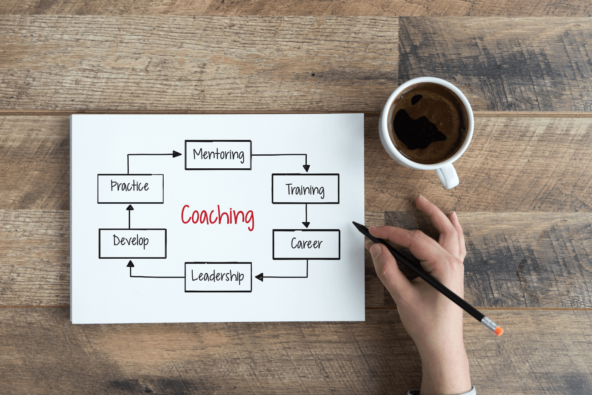
It’s Sarah here, one of the HR Advisors here at Metro HR. I recently qualified as an Associate Certified Coach (ACC). This is a certification issued by the ICF (International Coaching Federation), which is important because this means I have met specific standards and requirements and am dedicated to upholding strong principles of ethical behaviour in coaching.
I’m really passionate about the power of coaching and as such, I wanted to share a special guest post with you to take a closer look at the power of coaching, and some of the benefits in the workplace.
The ICF talk about how holding a credential is important to today’s coaching clients and they have the research to back that up. I must say, when I was a prospective client looking for a coach, long before I had trained as a coach myself, I was overwhelmed by what can only be described as a saturated market full of people calling themselves coaches!
I wasn’t even sure if it was a coach I needed, let alone find a credible genuine one! Wasn’t a coach just someone who asked questions? What is the point in that? Why would I pay for the privilege of being asked questions? I have the questions, and I want answers please!
Confusion about coaching and how it differs from other interventions is a very common quandary that coaches get asked quite a lot. It’s my job as a coach to know and understand how coaching differs from other approaches, to ensure that a client’s needs and expectations are met.


A good way to demonstrate the difference is using the example of wanting to learn to ride a bike. A therapist would have you approach the bike and ask you how it feels, what prior associations do you have with bikes and ask you what happened in the past.
A consultant would ride the bike, write instructions for the ‘how to’ and hand those to you. A mentor would say, “Let me share with you how I mastered biking, and I’ll give you tips on how to accelerate your mastery and connect you with other cyclists”.
A coach would say, “get on the bike, and I’ll walk alongside you until you can do it on your own”.
I learned this metaphor while training for my certification with the Co-Active Training Institute (CTI) and it’s so helpful. I use it in my first meeting with a client because depending on their goals, it is critical to understand the key differences.
There are many commonalities between the practices, particularly therapy and coaching. Both can focus on addressing behaviour changes and evoking awareness shifts by asking exploratory and open-ended powerful questions supporting a client’s self-guided discovery of their feelings and experiences.
Another useful way to think of it is that coaches receive credentials and therapists become licensed. As a qualified coach I would never attempt to provide therapy and would suggest a client seek a professional if those services were required instead of or alongside coaching.
Coaching focuses on visioning, success, the present and moving toward the future. It looks at the here and now.
As a Co-Active coach, I assert that the human getting coached is already naturally creative, resourceful, and whole. My role is an active one; in addition to asking questions, acknowledging what is going on for the client, and listening deeply, I’m also boldly there to interrupt, mirror, reflect, and call the client forth to help them design actions that break the barriers to their own transformation.
I build a strong system for accountability with clients, designing specific follow-up work for them in between sessions. I also help clients set goals for the coaching engagement, being clear with clients about what success looks like for the length of the coaching relationship.
Coaching does not go on forever and I bring the work with the client to a close purposefully and intentionally.

The ICF defines coaching as ‘partnering with clients in a thought-provoking and creative process that inspires them to maximize their personal and professional potential’.
The process of coaching often unlocks previously untapped sources of imagination, productivity and leadership. We all have goals we want to reach; challenges we’re striving to overcome and times when we feel stuck. Partnering with a coach can change your life, setting you on a path to greater personal and professional fulfilment.

Coaching and leadership development is a powerful way to unlock potential and drive employee performance, motivation and engagement in organisations. It creates a strong and positive culture based on the knowledge that coaching mindsets and skills empower people to engage in thought provoking discussions that go on to form actionable plans.
Coaching stimulates the values and what is important – unleashing the authentic potential that already exists in your employees and leaders. It unlocks the potential for them to maximise their own performance and people performing at their best means a high-performing organisation achieving what’s important to it.
As we’ve explored in this post, coaching is a powerful tool for personal and professional development, helping individuals and organizations unlock their full potential. Looking for coaches with the right credentials, such as an ICF certification, ensures that coaches adhere to the highest ethical standards and bring credibility to their practice.
Understanding the difference between coaching, therapy, consulting, and mentoring is key to ensuring the right support for your needs. Whether you’re an individual looking for transformation or an organisation aiming to foster a high-performance culture, coaching offers a structured and impactful approach to growth.


If you’re interested in finding out more about working with a coach, the ICF share some really useful hiring tips on their website.
If you’d like a bigger conversation about how coaching could fit into your organisation’s learning and development strategy, we’d love to support you!
Get in touch with us today to discuss how coaching can unlock new opportunities and drive meaningful change in your business.